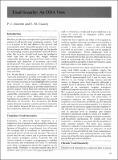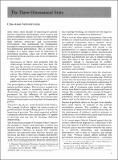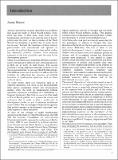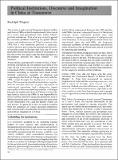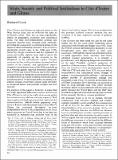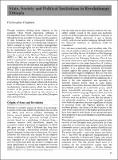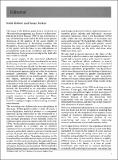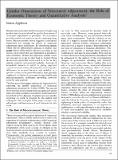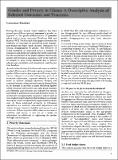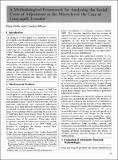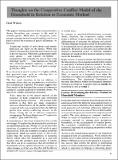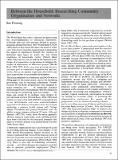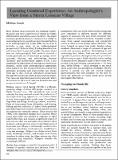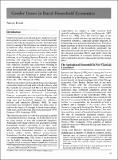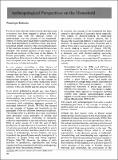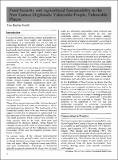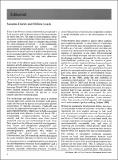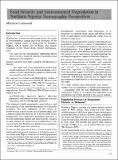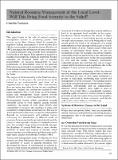Volumes 21 - 30: Getting Institutions Right for Women in Development: Recent submissions
Now showing items 61-80 of 444
-
Food Security: an ODA View
(Institute of Development Studies, 01/07/1990)Summary The usefulness of food security as a specific donor objective must be kept in perspective. Food security issues are best dealt with us a subset of poverty issues more generally; in the longer term, economic growth ... -
The Three?Dimensional State
(Institute of Development Studies, 01/10/1990)Summary Many conventional approaches to the study of Third World politics — especially, though not only, the ‘political development’ school — tend to get caught in an ‘Aristotelian trap’. That is, they think in terms of ... -
Introduction
(Institute of Development Studies, 01/10/1990) -
On State, Society and Discourse in India
(Institute of Development Studies, 01/10/1990)Summary This study analyses changes in the ways that the state and society in India have been thought about and talked about since the days of M. K. Gandhi. This is partly intended to improve on the ahistorical and ... -
Political Institutions, Discourse and Imagination in China at Tiananmen
(Institute of Development Studies, 01/10/1990)Summary The weakness of official institutions in China renders formal political discourse unreal and thwarts any attempts by organised social groups to engage in dialogue with those in political control. This is true of ... -
State, Society and Political Institutions in Côte d'Ivoire and Ghana
(Institute of Development Studies, 01/10/1990)Summary Ghana and Cote d'Ivoire have much in common, but their histories since independence have diverged. The conventional explanation for this divergence, which stresses contrasting economic politics, is less convincing ... -
State, Society and Political Institutions in Revolutionary Ethiopia
(Institute of Development Studies, 01/10/1990)Summary Ethiopia's experiment with the Leninist model is best seen as a means of forging the state into a centralised and disciplined structure of political control rather than as an attempt to apply socialist solutions ... -
Editorial
(Institute of Development Studies, 01/01/1991) -
Gender Dimensions of Structural Adjustment: the Role of Economic Theory and Quantitative Analysis
(Institute of Development Studies, 01/01/1991)Summary Macroeconomic theory identifies sectors which will be differentially affected by structural adjustment. This article considers the gender dimensions of such effects and how they can be analysed using large scale ... -
Gender and Poverty in Ghana: A Descriptive Analysis of Selected Outcomes and Processes
(Institute of Development Studies, 01/01/1991)Summary The paper presents some expenditure?based and basic needs poverty indicators for Ghana, disaggregated by gender. The similarity of living standards as measured across a number of indicators and gender groupings ... -
A Methodological Framework for Analysing the Social Costs of Adjustment at the Micro?level: the Case of Guayaquil, Ecuador
(Institute of Development Studies, 01/01/1991)Summary This article describes the methodology used to examine the social dimensions of debt, recession and structural adjustment policies in terms of their impact on low income urban households in Guayaquil, Ecuador. It ... -
Thoughts on the Cooperative Conflict Model of the Household in Relation to Economic Method
(Institute of Development Studies, 01/01/1991)Summary Mainstream economic theory has traditionally been content to treat the family or household as a single unit. Theory has often spilled over into practice so that researchers and planners also regard the household ... -
Between the Household: Researching Community Organisation and Networks
(Institute of Development Studies, 01/01/1991)Summary There is a growing appreciation of the importance of community and non?government organisations as factors in structural adjustment. Initially seen as an answer to poverty alleviation and later as providers of ... -
Location Gendered Experience: An Anthropologist's View from a Sierra Leonean Village
(Institute of Development Studies, 01/01/1991)Summary This is a case study of an anthropological approach to gender and rural economic issues, based on fieldwork in a Mende village in eastern Sierra Leone. To understand people's access to resources there, it is ... -
Gender Issues in Rural Household Economics
(Institute of Development Studies, 01/01/1991)Summary Economists working in agricultural development have been concerned to theorise and model the behaviour of households for a wide range of diagnostic and predictive purposes. These models combine two fundamental ... -
Anthropological Perspectives on the Household
(Institute of Development Studies, 01/01/1991)Summary British anthropology until the 1960s used the term household in the descriptive sense. The arena of activities which are concentrated in the household was theorized under the term ‘the domestic domain’, in relation ... -
Food Security and Agricultural Sustainability in the New Guinea Highlands: Vulnerable People, Vulnerable Places
(Institute of Development Studies, 01/07/1991)Summary In the Highlands of Papua New Guinea the vulnerability of people to a low quality and at times disrupted food supply, and the vulnerability of soil and vegetation resources to degradation, both relate to an ... -
Editorial
(Institute of Development Studies, 01/07/1991) -
Food Security and Environmental Degradation in Northern Nigeria: Demographic Perspectives
(Institute of Development Studies, 01/07/1991)Summary The Malthusian debate over the effects of population growth on food security and natural resource use in Hausaland, Nigeria is reviewed. It is argued that a resolution of the debate at the macro level is not ... -
Natural Resource Management at the Local Level: Will This Bring Food Security to the Sahel?
(Institute of Development Studies, 01/07/1991)Summary This paper argues that reform of resource management systems is a necessary but not a sufficient condition for achieving greater food security in the Sahel. Such reform would involve the transfer of rights and ...

